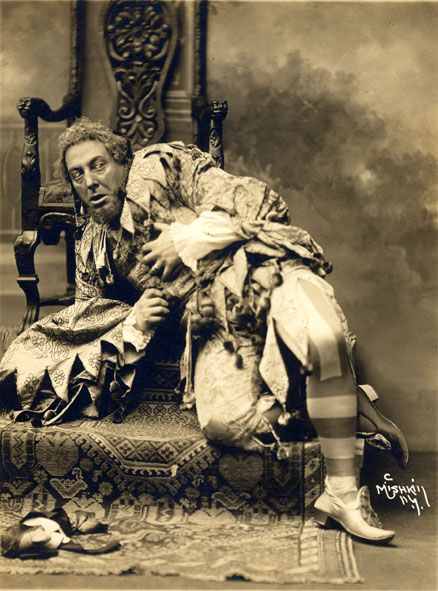Terrific cast trumps variable musical direction in the Met’s “Rigoletto”
Worlds collide in Rigoletto. Not only does Verdi pit the cynical world of politics against the fragile innocence of domestic bliss, but musically, too, he sets his characters on a collision course. The Duke with his dashing set-piece arias stands for the old opera seria, while the jester Rigoletto – volatile, affect-driven and sensitive to a kaleidoscope of conflicting emotions – is the voice of opera’s future.
In the current revival of the Metropolitan Opera’s Rigoletto, dominated by Italian tenor Francesco Meli as the libertine Duke and Georgian baritone Lado Ataneli as the hunchbacked jester, this conflict is beautifully played out. It was a triumphant Met debut for Meli who will also sing Alfredo in this season’s revival of La Traviata.
Meli has a bright, youthful tenor which he is able to inflect with a sufficient degree of sharpness when required, while drenching it in honey in his seduction of Gilda. So far, his career has been heavy on bel canto opera – as well as Mozart – but Saturday night’s performance suggested plenty of promise as he embarks on more dramatic roles. His Gabriele Adorno in Simon Boccanegra at the Vienna State Opera later this season is surely one to look forward to.
Ataneli is no stranger to Met audiences since his debut as Germont in La Traviata in 2003 and, more recently, the title role in Macbeth. The word “natural” often crops up in reviews of his performances, and in this demanding role, too, there was the illusion of effortlessness in his voice production which masks the great art and – no doubt – hard work he brings to the stage.
Trained at La Scala, Ataneli appears very much at home in Verdi and seems to relish the long arching phrases the composer requires of him. As an actor, Mr Ataneli is decidedly Old School. Leaning now to this side, now to that, he waved his fool’s scepter about the dedication of a bored altar boy sprinkling incense. A light-footed skippety-hop in Act I was followed by a walk so torturously arthritic that it seemed as if one of the courtiers had suddenly clamped a ball and chain to one of his ankles. Vocally, however, Ataneli was absolutely convincing, adding layers of darkness to his part as the opera took its tragic course.
Rounding out the excellent male line-up were Andrea Silvestrelli in his Met debut as a powerful Sparafucile with a voice that was perhaps a little too beautiful in the upper ranges for such a nefarious character, and Keith Miller as a Monterone who delivered his curse with a rich, well-rounded bass-baritone.
Christine Schäfer was an unusual choice for Gilda, a role which blends the lyricism of Bellini and Donizetti with Risorgimento passion. At the Met, the German soprano’s Schäfer’s previous incarnations include an adorable Gretel and a touching Sophie in Der Rosenkavalier, roles that – -along with Mozart – suit her Viennese-flavored soprano beautifully.
To Gilda she brought the same luminous, evenly produced soprano, shimmering with color. But her voice seemed strangely detached from her character and underwent few changes in the course of the opera. In her first duet with Rigoletto – to a somewhat rushed tempo – there was already too much nobility and not enough innocence in her voice, leaving little space to grow. Her Caro nome was delivered with exquisite phrasing but at such a slow tempo that some of her high notes threatened to lose their color. Her final aria – sung half encased in a burlap sack – was the only truly vivid dramatization of a character who, for most of the opera, appeared already too good for this earth.
In a production marked by great singing and indifferent acting, Nino Surguladze stood out for her feisty physical presence. The Georgian mezzo, who acted in films and sang with pop groups before committing to a classical career, brought a sultry Maddalena to the table – quite literally in a scene that saw the Duke all but devouring her as she sprawled next to his wine glass.
The scene served to highlight the many missed opportunities of Otto Schenk’s stand-and-sing production as it limps into its third decade. Created in 1989 for a cast that included Luciano Pavarotti as the Duke, it is traditional almost to the point of comedy with the sort of marbled-paint sets that were once the height of rustic sophistication. Peter Gelb should consider retiring them soon, if only because they offer patchy acoustics.
Equally patchy was the music direction by Paolo Arrivabene in a Met debut that offered few memorable moments. He drew some beautiful colors from the orchestra, particularly in the thunderstorm scene in Act III, but on the whole he seemed more interested in the dramatic surges in the score than in the long – but crucial – passages in which the orchestra provides a light rhythmic accompaniment. Meli’s La donna e mobile, for instance, was an example of judicious phrasing and restrained showmanship, but poorly coordinated with the orchestra. The chorus, too, singing with fine dynamic control, seemed to have trouble following Mr Arrivabene’s direction. A shame, for a cast of this quality deserved better.
Rigoletto will be playing with the same cast on October 5, 8 and 14, and remains in repertoire, with cast changes, through May 12, 2011. metoperafamily.org. 212-362-6000
